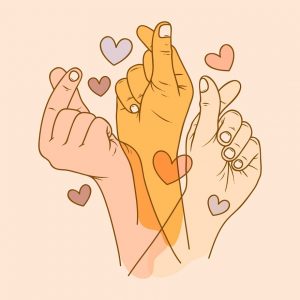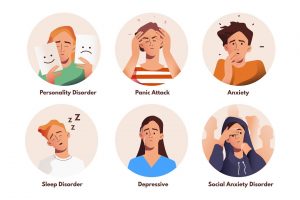20 Sexual Health
Ally Arroyo; Daniela Vasquez; Andi Luca; and Kailyn Sanato
Sexual Health

What is sexual health?
Most would believe that sexual health only has to do with the transmission of diseases or merely having a dysfunction; however, this is untrue. Sexual health is the physical, emotional, mental, and social well-being concerning sexuality. When talking about sexual health, people usually feel embarrassed and ashamed because they focus more on the connotation of the word sex. It is taboo for many to discuss, but this makes sexual health so much more important. Sexual health can be an umbrella covering plenty of issues such as sexuality, gender, relationships, sexually transmitted diseases, and many more. In this chapter, we will be discussing and learning more about the benefits of being more knowledgeable of one’s sexual health and how to determine if one is, in fact, sexually healthy. This section will also cover the physical and emotional effects of sexual abuse and sexually transmitted diseases.
Are you practicing sexually healthy habits?
For one to consider themselves sexually healthy, they must first be able to approach the topic respectfully. A sexually healthy person is someone who can experience sexual pleasure, are satisfied, and are intimate when they feel like having these types of experiences. However, this is not the only way. There is a whole aspect of sexual health that is commonly ignored because of its taboo nature. A sexually healthy person must also openly communicate with others, such as their partners and their local medical providers whenever it is needed. Someone is also considered sexually healthy with the relationship they have with themselves.
Most sexual acts are between two people; however, for one to feel comfortable with doing such acts, they must first feel comfortable with themselves. Accepting one’s body and having a sense of self, can help people create a safe environment for them to unapologetically express themselves. This directly connects to someone’s self-esteem and self-worth. These ideas are essential when talking about sexual health. It allows a person to know what they want from their partner and ensure that safe sex is practiced, without any coercion or violence.
Furthermore, to be sexually healthy it is essential to know that when talking about sex, it is nothing to be ashamed of. When participating in sexual activities with yourself or others, it is critical to keep in mind that it is normal to experience pleasure. When practicing safe and healthy sex, there can be a lot of positive benefits that come from it. Some health benefits associated with sex include the release of stress, lower levels of depression, improvements in cardiovascular health, closeness to a partner, a greater understanding of self, and increased self-confidence. When participating in sexual acts with someone, it can positively boost your self-esteem and bring confidence to your everyday tasks. Having safe and consensual sex allows one to be more aware of their mind and body. There should be no shame in that. Since it is an activity that almost everyone around the world participates in, we must all stay safe while enjoying these activities.
STIs

Being knowledgeable and taking responsibility are also vastly important parts of being sexually healthy. One must go into any type of sexual activity with the knowledge of the consequences and take any, if not all, precautions to be safe during these activities. Precautions such as using protection during sex, researching birth control options, and, most notably, talking with your partner and healthcare providers. All in all, safe sex is healthy sex. When discussing protection, most people think about the transmission of sexually transmitted infections (STIs) or sexually transmitted diseases (STDs). STIs can be bacteria, parasites, and viruses. The transmission of STIs is a hugely important global health priority because of its effects on any person. Along with devastating physical effects, STIs can cause psychological effects such as; frustration, anxiety, fear of rejection, anger, the feeling of isolation, guilt, and, most importantly, a sense of disgust in themselves or contamination. These adverse psychological effects could potentially be more important than the physical impact of STIs.
Sexual Abuse

Sexual abuse can be defined as unwanted sexual activity where perpetrators use force and violence with victims who do not consent. Sexual abuse is a critical topic when talking about sexual health. It’s an issue that can happen to anyone regardless of their age, gender, race, or sexual orientation.
While in college, there have been multiple studies that show that women from the ages of 18 – 26 are the most targeted victims. Though sexual abuse can happen to anyone, there have been studies that say one in every five women will be targeted for sexual abuse while in college or other higher levels of schooling. Those who are sexually abused are known to have effects such as a change of personality and psychological trauma that can last a lifetime. Other detrimental effects include depression, anxiety, post-traumatic stress disorder, loss of self-confidence or self-esteem, addiction, and suicide. Unfortunately, during this age, many victims of sexual assault do not report the incident and suffer from these personality changes. Sexual abuse is also difficult to prove because of the lack of witnesses. Because of this, there are many reasons why someone may not come forward to report their abuse or even share their experience with close friends or family members. Many victims believe that they cannot take action and speak up about their sexual abuse simply because there is no proof. Even when some do try to take action and speak up, they are often ignored. It has been shown that one reason why someone might not speak up is self-blame. This causes the victim to ask questions about what they did wrong and can lead to them blaming themselves for what happened. When being a victim of sexual abuse, one can often feel lonely and disengaged from everyday life. In turn, this makes the idea of speaking up intimidating and distressing. Not to mention, there is also the fact that someone may not report sexual abuse because they simply did not know it was abuse. There have been reported cases of 60.4% of women that have experienced an incident of rape and didn’t realize it even though it fit the definition.
Rape is an unwanted sexual experience obtained through force or a sexual experience they did not consent to because they were incapacitated. This fact is important to bring to light because it suggests that the awareness of rape is not widely known and could hinder the data to finding the true occurrence rate of these types of experiences. So when reporting sexual abuse, it is important to remember that it takes an enormous amount of courage to do so, and it is the first step in the right direction. While reporting your experience, it is crucial to be persistent and never stop looking for an ally until your voice is heard. Luckily here at PVCC, your voice will always be heard, and you’re able to find the help you need from staff, educators, campus officers, and other students. Remember, you deserve justice, strength, or simply peace of mind for what you’ve been through.
Conclusion: The Importance of Addressing Sexual Health On College Campuses

For many students, college is a time to learn about themselves and their relationships, including their sexual relationships. This means that sexual health is a super important topic that should be openly discussed in college for the health of all students. Students should make sure that they are communicating with their partners and asking questions such as, “Are we monogamous?”, “Are you willing to get tested?”, and “How do you feel about contraceptives?” in order to practice safe sex. Students should also take all precautions to stay safe and healthy during any sexual activity. Lastly, students should feel comfortable enough to talk to those around them for the best possible comfort and advice. This comfortability needs to be present at home with family and friends or on campus with counselors willing to help. This connects to the fact that most sexual abuse, harassment, and assault occurs on college campuses and is only increasing. These acts must be addressed on college campuses for students who find themselves or others in these horrific situations. There is a severe lack of awareness and education on sexual abuse, assault and, harassment on campuses that lead to many college students being unaware of the available services and resources that their college might offer, such as contacting their counseling advisors. Being a college student proves itself to be an already difficult task and anyone can imagine how much harder it would be for them to have to deal with any troubles in their sexual health alone.
Resources
- Counseling: Paradise Valley Community College has free access to personal counseling that will help you with college. However, the counselors are not permitted to do therapy, but they assist students in how they can cope with stress and learning more about themselves. All appointments conducted through a phone call, just dial 602-787-6540 or email counseling@paradisevalley.edu
- Back to Planned Parenthood Arizona, Inc.: Planned Parenthood Arizona, Inc. is the biggest sexual health organization in the state of Arizona. It educates every individual about their sexual health and promotes healthy sexual habits. To book an appointment, call 1-800-230-7526.
- National Sexual Assault Hotline: RAINN or Rape, Abuse, Incest National Network is an anti-sexual violence organization and it controls the National Sexual Assault Hotline. If you need assistance, call 800-656-HOPE (4673). The hotline is available 24/7 and you can chat them through online.rainn.org
- Bikers Against Child Abuse (B.A.C.A): This group is passionate about creating a safer environment for abused children. They pride themselves on being advocates to end child abuse and give children their life back. To see what they’re all about or to contact B.A.C.A visit their home page.
- National Sexual Violence Resource Center: The National Sexual Violence Center is a website that has a number of resources for specific groups such as sexual assault survivors, friends, family, advocates, educators, and media, press. You can also find help, get involved, and donate through the website.
Media Attributions
- “Finger heart illustration Free Vector” © freepik
- Safe sex neon sign
- 4477227
- Young attractive smiling student showing thumb up outdoors on campus at the university © freepic.diller is licensed under a CC BY-SA (Attribution ShareAlike) license

